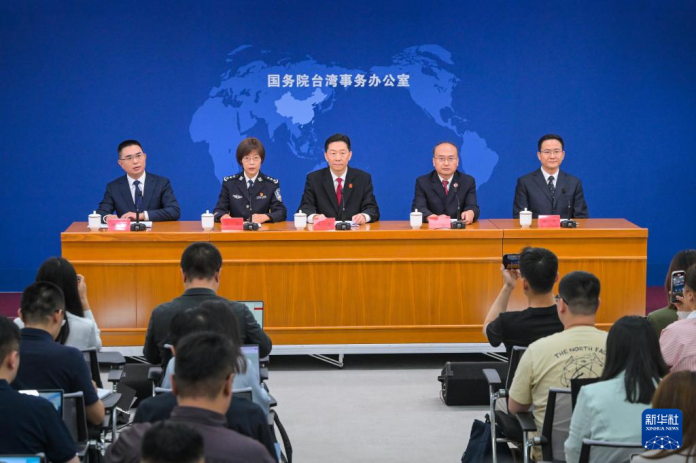On June 21st, China’s Taiwan Affairs Office (TAO) held a press conference to announce new “Opinions on Punishing, in Accordance with the Law, The Crimes of Secession, and Incitement to Secession Committed by Hardcore ‘Taiwan Independence’ Elements.” Officials from the Ministries of Justice and Public Security, along with the Supreme People’s Court and the Supreme People’s Procuratorate, joined the press conference to announce the new opinions.
Press Conference
The officials from the four Chinese ministries, judicial organs, and TAO discussed the law and answered questions asked by reporters from various state-owned news outlets. Supreme People’s Court Trial Committee member Ma Yan provided a brief explanation of the opinions and their contents during the first part of the conference. The second half of the conference consisted of the five officials answering questions that provided further context and information to the opinions. However, two of the answers that the Chinese officials provided stood out since the information was not included in the document.
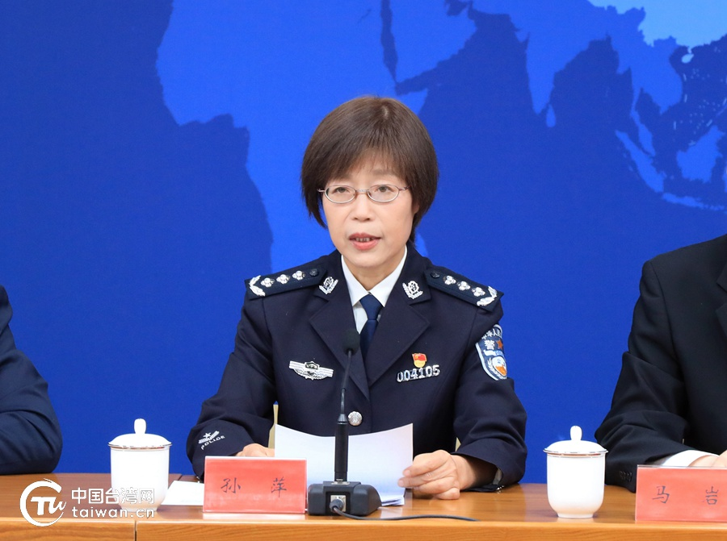
The most significant answer the officials gave during the question-and-answer period was outlining the statute of limitations for each crime. The Ministry of Public Security Legal Affairs Bureau’s Deputy Director, Sun Ping, said that there are “different periods of recourse for the crimes of secession and incitement of secession, depending on the circumstances of the crime.” The crime of inciting the secession of Taiwan is five years, but the Chinese government has 15 years to charge the individuals. China can sentence Taiwanese individuals to death if they are found guilty of secession, and the country has 20 years to charge individuals under the Anti-Secession Law. However, Sun also highlighted that China can still charge Taiwanese with crimes under the law if the crimes are “particularly egregious and the consequences particularly serious,” if the 20-year statute of limitations has passed, and if the Supreme People’s Procuratorate has approved the process.
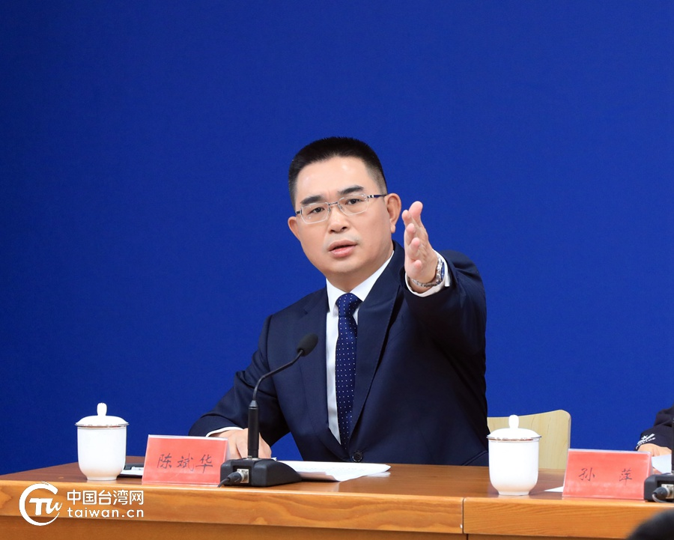
The TAO spokesperson, Chen Binhua, answered the question regarding the possibility of including more people than the 10 Taiwan independence activists previously announced by China. Chen said that Chinese judicial organs and law enforcement “will resolutely take punitive measures and severely punish them according to the law” against “hardcore ‘Taiwan independence’ elements” who committed or incited secession. He “advised” Taiwanese independence supporters to “recognize the situation” in the face of the legal punishments for inciting secession and to “change their ways.”
Opinions on Anti-Secession Law
The document began by listing the various judicial organs and ministries involved in investigating and persecuting crimes in China. It then discussed the rationale for the opinions, such as to punish the crimes of secession and incitement to secession by “Taiwan independence intransigents” and to “safeguard national sovereignty.” The document said that the Ministries of Justice, Public Security, and State Security, along with the Supreme People’s Court and Procuratorate, created the opinions on May 26, 2024.
The opinions contains 21 articles separated into four chapters: general requirements, accreditation of fixed crimes, correct application of procedures, and supplementary provisions. The general requirements chapter says that the “secessionist activities” of a small number of Taiwan independence activists “seriously jeopardized the peace and stability in the Taiwan Strait.” These actions undermined the common interests of compatriots on both sides of the Taiwan Strait and damaged the interests of the Chinese nation. The ministries and judicial organs will use their functions to “severely punish” the independence activists for their secession activities and encouragement of secession “according to the law,” as well as to safeguard national sovereignty, unity, and territorial integrity.
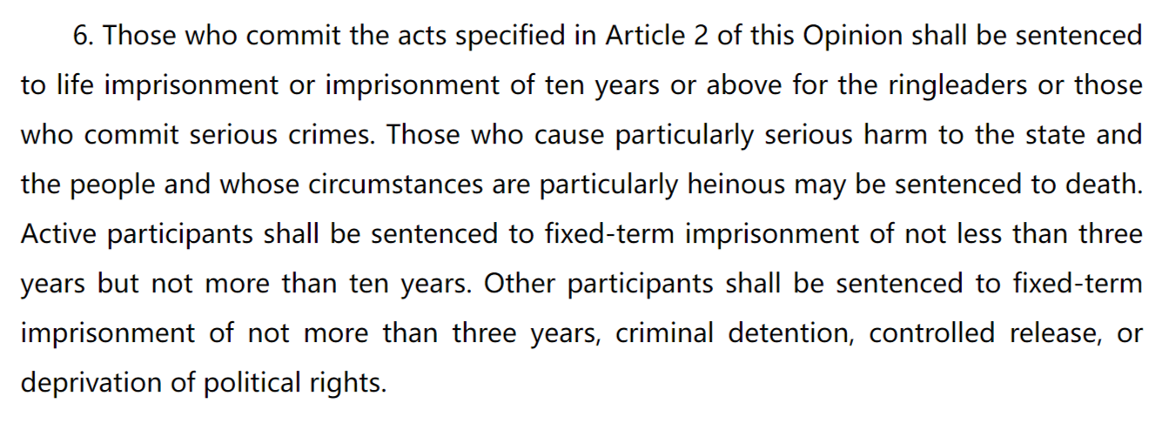
The second section of the document described the various actions that would be considered crimes of secession or incitement of secession, separated into 11 articles. Furthermore, the articles contained the various sentences that the Chinese government could hand out to individuals found guilty of secession. For example, individuals found guilty of secession activities could receive the death penalty, while those who actively participated in them can receive between three and ten years in prison. The section also specifies that individuals who evade the investigation or trial will not be subject to the statute of limitations.
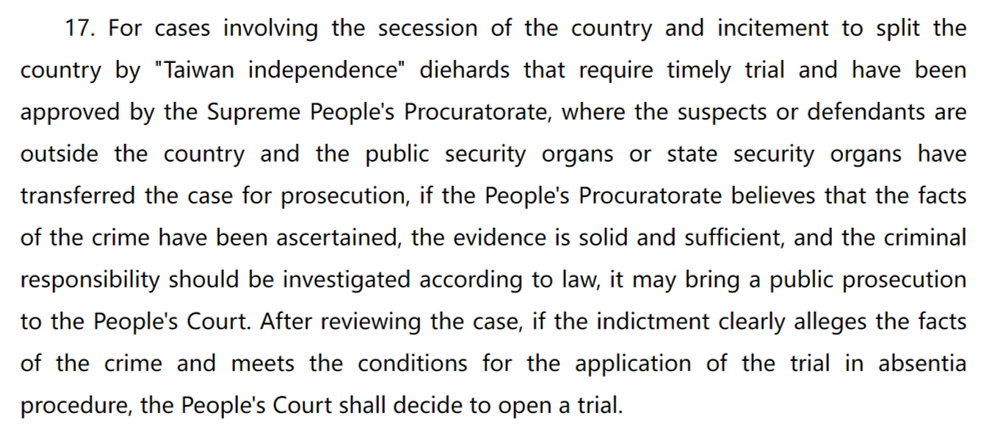
The third section outlines how Chinese law enforcement agencies and judicial organs will handle the suspects and trials. The section contains seven articles. The most significant article is how the opinion allows the Supreme People’s Court to try individuals accused of secession or of inciting secession in absentia. The section also contains two articles related to how the court will handle cases if Taiwanese individuals stop independence activities. The first article allows an individual’s case to be revoked if they “voluntarily” give up their stance on Taiwanese independence and work to mitigate the harm done by their past actions. The other article says that the court will show leniency to individuals if they confess to their crimes and accept punishment.
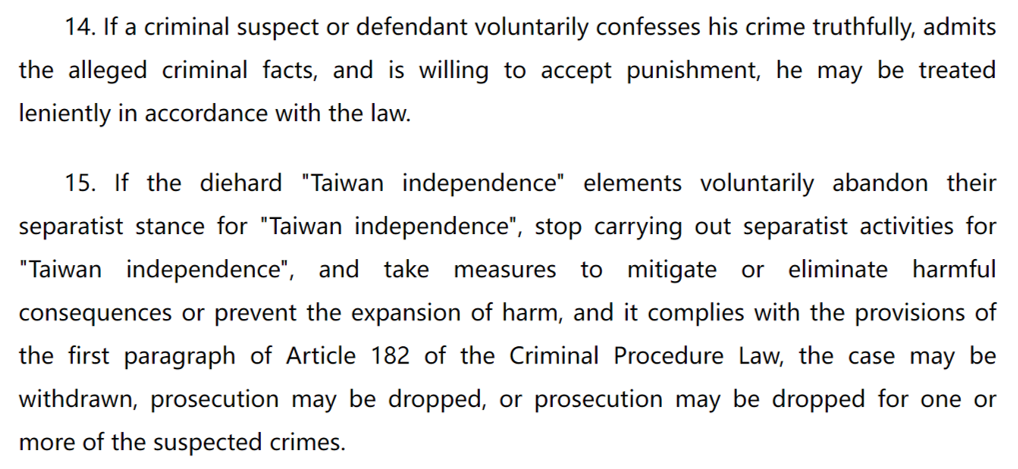
The section also allows Chinese law enforcement agencies to issue warrants and “take effective measures” to pursue cases against individuals accused of “Taiwanese independence activities.” The last section of the document, the supplementary provisions, contains two articles. The first article said this document would cover other crimes against national security allegedly committed by Taiwanese independence activists. The other article stated that the opinions contained in this document would be effective from the date of publication.
Analysis
China will use the opinions to prevent Taiwan from increasing its international recognition and relationships, prevent Taiwan from continuing to develop a distinct Taiwanese identity, and allow the Kuomintang (KMT) and other pro-Beijing parties to advance China’s aims on the island. Furthermore, China will use the opinions to intimidate Taiwanese activists and politicians who advocate for Taiwan’s independence.
The opinions are codifying China’s long-held stance regarding Taiwan, and China will use the document to prevent Taiwan from expanding its interactions with foreign countries and international organizations. The articles that are contained in the opinions’ second section specify several activities that Taiwan has undertaken in the last two to three years. For example, Taiwanese officials met with their senior counterparts in Taiwan and on foreign trips, which China would interpret as violating Article Two, Subsection Three. These trips allow Taiwan to increase its legitimacy as an entity separate from China, which goes against the country’s narrative that the island is a part of one China. China also fears that if more countries begin to interact with Taiwan, they will begin to push for the island to be formally included in international organizations such as the U.N. and the World Health Organization.
China will also use the opinions to prevent Taiwan from creating a separate history and identity that is distinct from the mainland. This is important because China’s narrative that Taiwan is a part of “One China” emphasizes that the country has controlled the island since “ancient times.” Furthermore, China will prevent organizations from holding events that promote Taiwanese history because it would go against the country’s narrative that both sides of the Taiwan Strait share the same history. China uses the notion to propagandize that the people living on both sides of the strait are the same because they share the same culture, history, and identity. The country is also apprehensive about Taiwan developing a separate history because it will lead to the solidification of a Taiwanese identity distinct from the mainland. This Taiwanese identity would be vehemently against any efforts by pro-Beijing political parties, such as the Kuomintang (KMT), to increase relations or unify with China. Their opposition would be based on the notion that the Taiwanese identity is different from the identity that exists in mainland China.
Neither the Anti-Secession Law nor the opinions give a definitive definition to the word suppression, which allows China to label any attempt to suppress these groups as anti-secession activities. For example, China would view any attempts at prosecuting Taiwanese individuals or groups that promote cross strait relations as violating the subsection, regardless of whether those entities are guilty of crimes. China has an incentive to prevent Taiwan from trying these individuals because they work with the United Front Work Department (UFWD) or Chinese intelligence agencies to advance China’s goal of “reunification” on the island. Another aspect of the law is its prohibition of the “suppression” of political parties that support cross strait relations and “national reunification.” China added political parties to the list to protect the KMT and other pro-Beijing political parties from any potential legal action from the DPP government. Furthermore, it would allow the parties to freely cooperate with the UFWD, the TAO, and other agencies to further China’s goals in Taiwan.
The guidelines also serve to intimidate Taiwanese activists and politicians who have currently or previously advocated for Taiwan’s independence. The opinions would allow Chinese law enforcement agencies to issue warrants for Taiwanese individuals suspected of secessionist activities. China would likely issue warrants as part of its intimidation and influence campaign to dissuade Taiwanese activists and politicians from continuing perceived secessionist activities, such as meetings with foreign officials. Taiwanese individuals would be extremely concerned over the warrants because of the potential for Chinese authorities to conduct renditions to bring them to China to stand trial or to serve their sentences. The opinions would allow the Supreme People’s Procuratorate to hold trials on secessionist activities in absentia. The Procuratorate would enable China to try and sentence Taiwanese activists or politicians without them being present at the trials. Sun’s comment about China’s ability to charge individuals under the law beyond the 20-year statute of limitations if they are considered serious provides a further intimidation tactic. China will use this to charge Taiwanese activists and politicians who were previously active in Taiwan independence activities.

